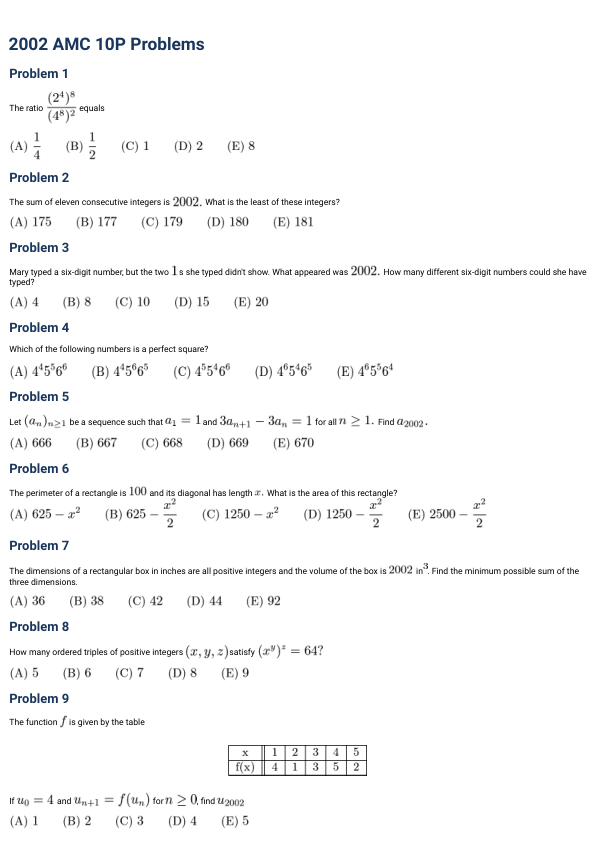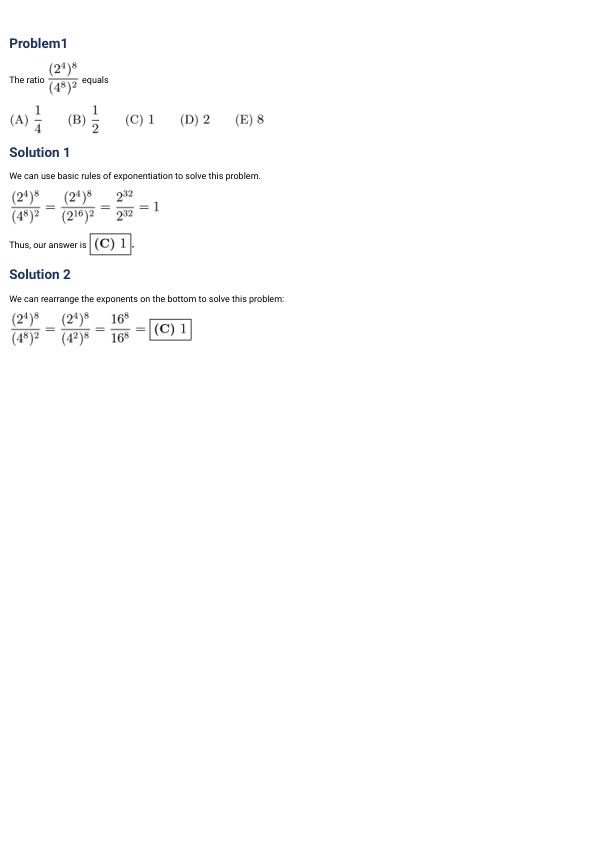2002 AMC amc10 真题 答案 详解
| 序号 | 文件列表 | 说明 | ||
|---|---|---|---|---|
| 1 | 2002-amc10-paper-eng.pdf | 4 页 | 182.57KB | 英文真题 |
| 2 | 2002-amc10-solution-eng.pdf | 27 页 | 981.81KB | 真题文字详解(英文) |
英文真题
2002 AMC 10P Problems
Problem 1
The ratio (\frac{(2^4)^8}{(4^8)^2}) equals
(A) (\frac{1}{4}) (B) (\frac{1}{2}) (C) (1) (D) (2) (E) (8)
Problem 2
The sum of eleven consecutive integers is (2002). What is the least of these integers?
(A) (175) (B) (177) (C) (179) (D) (180) (E) (181)
Problem 3
Mary typed a six-digit number, but the two (1)s she typed didn't show. What appeared was (2002). How many different six-digit numbers could she have typed?
(A) (4) (B) (8) (C) (10) (D) (15) (E) (20)
Problem 4
Which of the following numbers is a perfect square?
(A) (4^{4}5^{5}6^{6}) (B) (4^{4}5^{6}6^{5}) (C) (4^{5}5^{4}6^{6}) (D) (4^{6}5^{4}6^{5}) (E) (4^{6}5^{6}4^{4})
Problem 5
Let ((a_n){n \geq 1}) be a sequence such that (a_1 = 1) and (3a).} - 3a_n = 1) for all (n \geq 1). Find (a_{2002
(A) (666) (B) (667) (C) (668) (D) (669) (E) (670)
Problem 6
The perimeter of a rectangle is (100) and its diagonal has length (x). What is the area of this rectangle?
(A) (625 - x^2) (B) (625 - \frac{x^2}{2}) (C) (1250 - x^2) (D) (1250 - \frac{x^2}{2}) (E) (2500 - \frac{x^2}{2})
Problem 7
The dimensions of a rectangular box in inches are all positive integers and the volume of the box is (2002) in(^3). Find the minimum possible sum of the three dimensions.
(A) (36) (B) (38) (C) (42) (D) (44) (E) (92)
Problem 8
How many ordered triples of positive integers ((x, y, z)) satisfy ((x^y)^z = 64?)
(A) (5) (B) (6) (C) (7) (D) (8) (E) (9)
Problem 9
The function (f) is given by the table
If (u_0 = 4) and (u_{n+1} = f(u_n)) for (n \geq 0), find (u_{2002}).
(A) (1) (B) (2) (C) (3) (D) (4) (E) (5)

真题文字详解(英文)
Problem 1 The ratio (\frac{(2^4)^8}{(4^8)^2}) equals
(A) (\frac{1}{4}) (B) (\frac{1}{2}) (C) (1) (D) (2) (E) (8)
Solution 1 We can use basic rules of exponentiation to solve this problem. [ \frac{(2^4)^8}{(4^8)^2} = \frac{(2^4)^8}{(2^{16})^2} = \frac{2^{32}}{2^{32}} = 1 ] Thus, our answer is (C) (1).
Solution 2 We can rearrange the exponents on the bottom to solve this problem: [ \frac{(2^4)^8}{(4^8)^2} = \frac{(2^4)^8}{(4^2)^8} = \frac{16^8}{16^8} = (C) 1 ]

